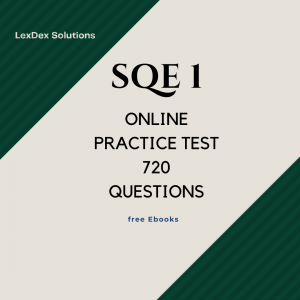SQE1 Exam Timing: Time management is one of the biggest challenges candidates face when preparing for the SQE1 exam. The exam’s combination of multiple-choice questions and scenario-based questions tests not only your legal knowledge but also your ability to analyse complex fact patterns, identify the relevant legal issues, and apply principles quickly and accurately under pressure. Even strong candidates often struggle to complete all questions within the allocated time, which can result in unnecessary stress, rushed answers, and lost marks, particularly on intricate scenario questions in areas such as Land Law, Business Law, and Ethics. Improving your exam timing requires more than simply working faster; it demands strategic planning, systematic practice, careful prioritisation, and a range of proven techniques designed to help you manage each section efficiently. Developing effective timing strategies also involves understanding how to approach multiple-choice questions without overthinking, reading scenario questions actively, spotting issues quickly, and pacing yourself to ensure both speed and accuracy. Many candidates underestimate the importance of timed practice, which allows you to simulate real exam conditions, identify weak points, and gradually build both stamina and confidence. By mastering SQE1 exam timing, you not only improve the likelihood of completing all questions but also enhance the quality of your responses, as you have sufficient time to analyse each scenario carefully and apply the law precisely. This guide outlines five practical, evidence-based strategies that can help candidates manage their time more effectively during SQE1, sharpen analytical efficiency, and maximise overall performance in one of the most challenging stages of qualifying as a solicitor.
1. Familiarise Yourself with the SQE1 Exam Format
One of the most overlooked aspects of improving SQE1 exam timing is a thorough understanding of the exam’s format and structure. SQE1 consists of 180 multiple-choice questions split into two papers, covering a wide range of legal subjects, including Business Law, Property Law, Dispute Resolution, Wills and Trusts, and Ethics. Each paper is timed, and candidates are expected to complete all questions within the allotted period, which can create significant pressure for those unfamiliar with the format. Scenario-based questions are particularly challenging, often embedding multiple legal issues within a single fact pattern, requiring careful reading, issue spotting, and application of law. Candidates who have not practised under exam-like conditions may misjudge how long to spend on complex questions, leading to rushed answers or incomplete sections. Understanding the distribution of question types, the weight of marks, and the complexity of scenarios allows you to develop a SQE1 exam timing pacing strategy tailored to your strengths and weaknesses. Familiarity with the structure also enables you to prioritise high-scoring questions and identify sections where you need to allocate extra time. Regularly reviewing past SQE1 papers, question samples, and practice tests will help you internalise the format, reduce anxiety, and build confidence in managing your time effectively. Ultimately, knowing the exam format inside and out is the foundation upon which all other SQE1 Exam timing strategies are built.
2. Develop a Strategic Time Allocation Plan
Creating a clear, structured time allocation plan is critical for effective SQE1 exam timing. Multiple-choice questions may appear straightforward, but scenario questions often require several minutes of careful analysis to identify issues, apply relevant legal principles, and select the correct answer. Allocating time in advance for each type of question ensures you maintain a steady pace and do not spend excessive time on particularly difficult scenarios at the expense of easier questions. Many candidates underestimate how long complex questions take, especially in subjects like Land Law or Ethics, which often present layered legal issues and subtle traps. An effective plan should include buffers for reviewing flagged questions, double-checking calculations, and ensuring no sections are left incomplete. Practising with timed mock exams helps refine your allocation plan by showing which sections you naturally spend more time on and which you can complete more quickly. Over time, these insights allow you to adjust your pacing strategy dynamically during the real exam, giving you more control over your performance. Consistent use of a strategic time plan not only improves speed but also reduces exam-day anxiety, allowing you to focus on accuracy and application. A well-structured SQE1 exam timing allocation plan transforms your approach from reactive to proactive, making it easier to manage SQE1 scenario questions under pressure.
3. Practice Active Reading and Efficient Issue Spotting
Active reading is an essential skill for improving SQE1 exam timing, particularly when tackling scenario-based questions. Many candidates lose time by reading scenarios passively, absorbing unnecessary details, or failing to identify the key legal issues embedded within complex fact patterns. Active reading involves scanning the scenario for relevant facts, underlining important dates, relationships, and triggers, and summarising potential issues as you go. This method is particularly valuable in subjects like Business Law or Property Law, where scenarios often contain multiple overlapping issues that require careful analysis. Developing efficient issue spotting skills enables you to immediately focus on applying the relevant legal principles rather than getting bogged down in extraneous information. Regular practice with scenario-based questions under timed conditions helps reinforce this skill, allowing you to recognise common patterns and examiner traps quickly. By combining active reading with structured issue spotting, candidates can extract critical information more efficiently, maintain speed, and reduce errors caused by misinterpreting the facts. Over time, this technique improves both timing and accuracy, making it easier to tackle even the most intricate scenarios with confidence. Mastering active reading is therefore a cornerstone of effective SQE1 exam timing management strategies, as it maximises efficiency without compromising analytical depth.
4. Use Timed Practice Exams to Build Speed and Accuracy
Timed practice exams are one of the most effective ways to enhance both SQE1 exam timing and overall exam performance. Completing full-length practice papers under realistic conditions trains you to work efficiently under pressure and helps condition your mind to manage fatigue over the course of the exam. Timed practice allows you to identify question types that consistently slow you down, whether it’s detailed scenario questions in Land Law, complex multiple-choice questions on Contracts, or Ethics dilemmas that require careful reasoning. Analysing performance metrics from these practice exams enables targeted improvement in weak areas, helping you develop both speed and precision. Repeated exposure to the pacing and pressure of the exam improves not only timing but also confidence, reducing the likelihood of mistakes caused by panic or rushing. Additionally, timed practice helps you refine strategies such as when to flag difficult questions, how to allocate extra minutes to high-weight questions, and when to move on to prevent time loss. Over weeks of disciplined practice, these methods build exam stamina, sharpen analytical efficiency, and enhance your ability to apply legal principles quickly and accurately. Ultimately, integrating a SQE1 exam timing strategy into your preparation routine ensures that timing becomes a strength rather than a liability on exam day.
5. Develop Smart Answering Techniques for Multiple-Choice Questions
Multiple-choice questions in SQE1 are deceptively challenging because they test both knowledge and reasoning, and poor handling of them can waste significant time. To improve SQE1 exam timing, candidates should adopt smart answering techniques, such as quickly identifying keywords, eliminating obviously incorrect options first, and strategically flagging tricky questions to return to later. Many students fall into the trap of overthinking plausible distractors or spending excessive time on questions that could be answered more efficiently using elimination methods. Practising these techniques in mock exams reinforces the habit of making quick, accurate decisions under time pressure. Additionally, understanding the common patterns in SQE1 multiple-choice questions — such as recurring topics in Contracts, Property, or Ethics — allows you to anticipate likely pitfalls and respond more efficiently. Combining these techniques with a solid foundation of legal knowledge ensures that speed does not come at the expense of accuracy. By incorporating these methods, candidates can maintain a steady pace throughout the exam, confidently tackle both standard and complex questions, and maximise marks within the allocated time. Mastering multiple-choice answering strategies is therefore a critical element of SQE1 exam timing management, enabling candidates to optimise performance across the full breadth of the exam.
Improving your SQE1 exam timing is not about rushing but about working smarter and more strategically. By familiarising yourself with the exam format, developing a clear time allocation plan, practising active reading, completing timed practice exams, and employing effective multiple-choice strategies, you can manage your time more efficiently. These approaches not only reduce stress but also allow you to apply your legal knowledge fully and confidently. Consistent practice, careful planning, and disciplined timing will make a significant difference in your overall SQE1 performance.
FAQ:
1. How much time should I spend per SQE1 question?
While it depends on question type, a general benchmark is one minute per standard multiple-choice question and slightly longer for scenario questions. Adjust based on difficulty and familiarity with the topic.
2. Should I skip difficult questions to save time?
Yes, flagging complex questions and returning to them later is a recommended strategy. This prevents getting stuck and losing valuable time for other questions.
3. How can timed practice help with exam anxiety?
Timed practice simulates real exam conditions, which helps reduce stress and improves familiarity with pacing. Over time, this builds confidence and reduces the chance of freezing during the actual exam.
4. Are multiple-choice strategies really effective for saving time?
Absolutely. Techniques like eliminating obviously wrong answers, spotting keywords, and flagging tough questions allow candidates to move faster without sacrificing accuracy.
5. Can I improve timing without sacrificing accuracy?
Yes, with consistent practice and strategic techniques, you can maintain high accuracy while working more efficiently. Structured exam preparation ensures that speed complements understanding rather than undermining it.
6. How often should I do timed practice exams?
Weekly or bi-weekly timed practice is ideal, with progressively harder questions or full papers closer to the exam date. This helps build stamina, identify weaknesses, and track improvements.
Struggling to finish your SQE1 questions on time? LexDex Solutions offers targeted training materials, scenario-based practice questions, and exam strategies designed to boost your speed and accuracy. Our resources guide you through every subject area and teach techniques that save time while maximising marks. Don’t leave your exam performance to chance — take control of your timing today.
Access LexDex SQE1 training materials now and master your SQE1 exam timing strategy.
Time management is just one aspect of SQE1 preparation. LexDex Solutions also provides comprehensive materials covering Land Law, Ethics, Business Law, Dispute Resolution, and more, ensuring you are fully prepared for every section. By combining timing strategies with in-depth subject knowledge, candidates gain a holistic advantage that boosts both confidence and performance. Explore our full SQE1 library to enhance every facet of your SQE1 exam timing preparation.
While improving your exam timing is crucial, presenting yourself professionally in the workplace is equally important. Lawlio offers tailored CV templates that help students and aspiring solicitors showcase skills and achievements effectively. Pairing strong SQE1 exam timing preparation with a professional CV ensures you are ready both academically and professionally. Discover Lawlio templates to create a polished, recruiter-ready CV today.


